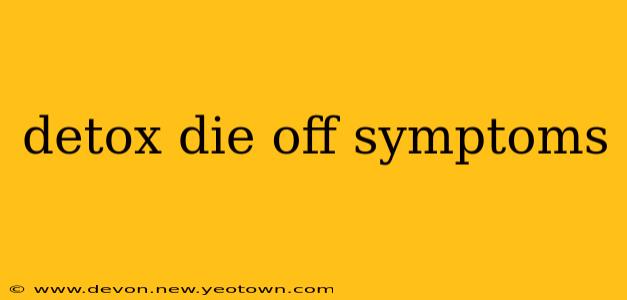Let's be honest, the idea of a "detox" conjures up images of pristine smoothies, vigorous workouts, and a renewed sense of vitality. But what happens when the body starts purging itself of accumulated toxins? This is where "die-off" symptoms come in, a sometimes-unpleasant reality of detoxification. While a "detox" is often a marketing term and the body naturally detoxifies itself, intense cleansing protocols can trigger reactions. This journey isn't always smooth sailing; it can be a bumpy road with some unexpected twists and turns.
What are Detox Die-Off Symptoms?
Detox die-off, also known as Herxheimer reaction, is a temporary worsening of symptoms as your body eliminates toxins. Imagine your body as a meticulously organized house undergoing a deep clean. Dust bunnies, cobwebs, and hidden grime—representing accumulated toxins—are being swept away. This process, while ultimately beneficial, can stir up temporary discomfort. The intensity varies depending on the individual, the type of detoxification method used, and the amount of accumulated toxins.
Think of it like this: you're cleaning out a very cluttered attic. As you start moving things, you might cough from stirred-up dust, or maybe you find a hidden wasp nest! These are temporary inconveniences as you work towards a cleaner, healthier space. Similarly, detox die-off symptoms are temporary and usually subside as the body adjusts.
Common Detox Die-Off Symptoms: A Closer Look
The symptoms can range from mild to moderate and can vary greatly depending on the person and the type of detox. It’s crucial to remember that these symptoms usually indicate your body is working to eliminate toxins, not that something is wrong.
Headaches: Toxins released into the bloodstream can trigger headaches as the body works to neutralize them.
Fatigue: The body expends considerable energy during detoxification, leading to feelings of tiredness or exhaustion.
Muscle aches and pains: As the body flushes out toxins, inflammation may occur, resulting in muscle soreness.
Flu-like symptoms: These include fever, chills, nausea, and body aches, mimicking a mild flu.
Skin reactions: Breakouts, rashes, or increased itching can occur as toxins are eliminated through the skin.
Digestive upset: Constipation, diarrhea, bloating, and gas are common as the digestive system works harder to eliminate waste.
Emotional fluctuations: Some people experience mood swings, irritability, or anxiety during detox.
How Long Do Detox Die-Off Symptoms Last?
The duration of these symptoms can vary widely, from a few days to several weeks. For most people, the most intense symptoms subside within a week. However, if symptoms are severe or persistent, it's essential to consult a healthcare professional.
What to Do During a Detox Die-Off?
The key during a die-off is to support your body’s natural detoxification processes. This can include:
- Hydration: Drinking plenty of water helps flush toxins out of the system.
- Rest: Allow your body ample time to rest and recover.
- Nourishing food: Focus on whole, unprocessed foods that support detoxification.
- Gentle exercise: Light activity can help support lymphatic drainage.
- Stress management: Stress can hinder detoxification, so incorporate stress-reducing activities like yoga or meditation.
Are Detox Die-Off Symptoms Dangerous?
While unpleasant, detox die-off symptoms are generally not dangerous. They are usually a sign that your body is working to eliminate toxins. However, severe or persistent symptoms warrant medical attention.
When to See a Doctor During a Detox?
It's important to seek medical attention if you experience:
- Severe or persistent symptoms that don't improve after a week.
- Symptoms that interfere with your daily life.
- Allergic reactions or other serious side effects.
Can You Prevent Detox Die-Off Symptoms?
While you can't completely prevent die-off symptoms, you can minimize their intensity by:
- Starting slowly: Gradually increase the intensity of your detox program.
- Supporting your liver and kidneys: Consume foods and supplements that support these organs' detoxification functions.
- Listening to your body: Pay attention to your body’s signals and adjust your detox plan accordingly.
Detoxification, while potentially beneficial, isn't a magical cure-all. It's a process that requires patience, self-awareness, and a supportive approach. Remember, the discomfort is temporary, and the long-term benefits often outweigh the initial challenges. Always consult with a healthcare professional before starting any new detox program, particularly if you have underlying health conditions.

